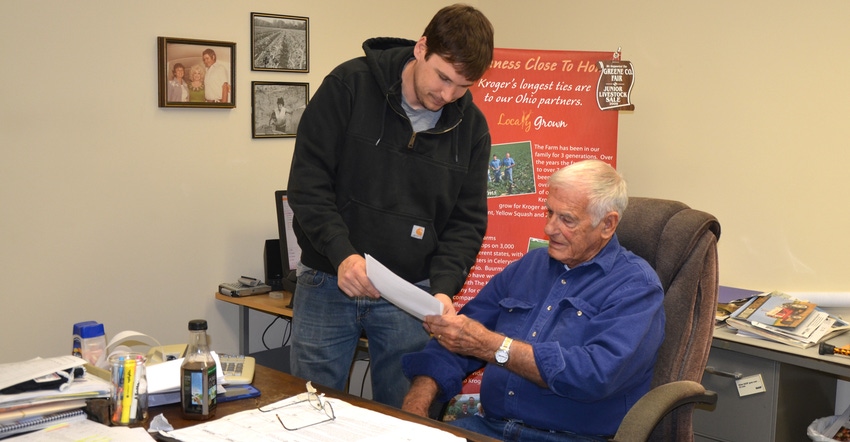
For the Guess family, survival meant changing with the times. In the early 1970s, grain prices started to improve and eventually improved enough to entice the brothers to sell their livestock. “Livestock is a lot of work; we thought maybe we should just grow row crops,” Mark Guess says. “We sold the livestock, bought more land and upgraded equipment.”
It worked well for Mark and his brothers, Steve and Tom, in the early ’70s, but then the farm depression of the early 1980s hit. “We held it together by looking at alternative crops, including waxy corn and popcorn,” Mark says.
They also raised hybrid seed corn for Pioneer for six years before the company shifted acreage to Michigan. However, when one door closed another seemed to open, as Heinz was at the same time looking for growers in southern Ohio. “We signed a contract to grow 120 acres of processing tomatoes,” Mark says. “We got up to 400 acres.”
They transitioned into fresh-market vegetables like zucchini, cabbage, eggplant, collard greens, kale, bell peppers and cucumbers. The vegetables were packed and sold under the label “Ron’s Pride.”
“We were selling direct into Kroger and Meijer,” he says. “It was the beginning of the homegrown era and that’s where the margins were.”
Surviving the ’80s
Nominator Bill Richards of Circleton says, “Mark slowly developed that vegetable business until it was a big vegetable business. Not only is he a Master Farmer, but also a master marketer and salesman. The family operation really prospered, and he was taking those profits and buying more and more productive land. A mark of a really successful farmer is one that can come back after adversity [farm crash of the 1980s] and put it all back together — and not only do better, but far better than before the catastrophe.”
The farm contracted with Heinz from the late 1980s up until 1996, when Heinz closed the nearby processing facility and shifted acreage north, near another processing facility, which would also close within a couple of years.
“We were lucky, though, because we were able to still sell our equipment, which included five very sought-after, harvest-aid equipment pieces my son, Ron, made,” Mark says.
Mark’s daughters were also involved in the farm in varying degrees. Teresa, who graduated from Ohio State University with a horticulture degree, took to growing the vegetable plants that would be transplanted for the farm in her greenhouses. “We didn’t do anything small,” Mark says with a snicker.
Back to basics
Today, the farm is back to corn and soybeans. “At one time we had 120 migrant workers, and we were dealing with labor camps and H2A visas,” Mark says. “It really was a lot of work, and the quality of the migrant labor was deteriorating. We got out.”
In 2000, Mark and Steve split Guess Brothers Farms. “We looked at our families and our land base, and decided it would be better to split it in two. It was very amicable," Mark says.
Mark took the Greene County land, while Steve took the Ferry County properties. “Both farms have grown, and it’s been good for both families.”
Mark’s new venture needed a name. The farm’s motto displayed on farm vehicles is ‘Our Business Is Growing.’ “I thought, we are a growing company; let’s call it Groco Family Farms,” Mark recalls.
The plan had always been for Mark’s son, Ron, to take over the farm. The management transition started more than 10 years ago; however, only a few months after being diagnosed with cancer, Ron died in April 2014. “It really left a hole in our family and the operation,” Mark says. “I really wanted him to take my place 100%, and then that happened. I had to come back.”
Mark’s son-in-law Rock Persinger, who is married to Cathy, and his grandsons, Philip, 33, and Brent, 35, who are Ron’s sons, are all active on the farm. The plan is to keep the farm in the family. “We have structured it so the next generation will be guaranteed to be together,” he says. “From there, it will be up to them.”
Mark sees some future farmers in the making with 10 grandchildren and 10 great-grandchildren and another “great” expected this summer.
About the Author(s)
You May Also Like






